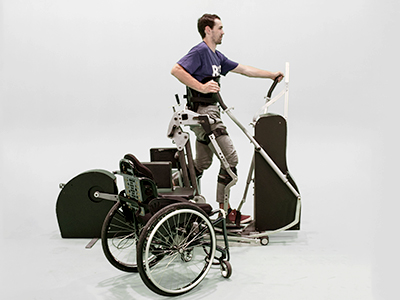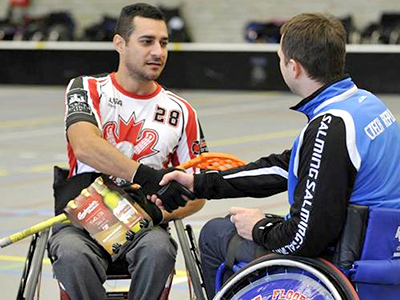
"I say yes to participating in research so I can help people with SCI live a healthier, easier life with fewer complications on a daily basis."
– Kyle Gieni, Vancouver
When it comes to participating in health research, 39-year-old Vancouverite Kyle Gieni is not your average study participant. Not only has he volunteered for more than 50 studies about spinal cord injury (SCI), but he has also helped develop new studies and get research grants to move projects forward. Gieni, a wheelchair user since 2003, admits that while he is heavily involved in research for the greater good of the SCI community, he also participates for the personal health benefits.
“Being in different studies has helped me stay healthy—I’ve had body scans, bone scans, free treatments and I’ve gotten to try out ground-breaking technologies,” says Gieni. “It was in the research world, while testing a robotic mobility device, that I walked for the first time in 10 years.”
“Because of research, I got up and walked again when doctors said that I wouldn’t.”
Vancouver Coastal Health Research Institute scientist Dr. Jaimie Borisoff recently included Gieni in a focus group looking at a new cardiovascular exercise device for people with SCI called the AAPLEwalk™ (Active-Arm Passive-Leg Exercise) machine. Borisoff developed the device with his team at the British Columbia Institute of Technology (BCIT) Rehabilitation Engineering Design Lab, which endeavours to get potential end-users of their projects and stakeholders involved throughout the design process. The AAPLEwalk™ offers cardio-respiratory training benefits and standing loco-motor therapy in a single device. The development team sees the machine being useful for people with a wide range of disabilities, beyond SCI, in the future.

Photo credit to BCIT Applied Research, REDLab
The AAPLEwalk™ was developed to address the lack of effective cardiovascular exercise modalities for people with full paralysis or SCI, and this is particularly true for individuals that cannot stand or bear weight on their legs and who rely on only their arms for cardiovascular exercise notes Borisoff.
“Exercising solely via the arms is thought to be insufficient stimulus for the cardiovascular and cardiorespiratory systems,” says Borisoff, who is also a wheelchair user. “It doesn’t offer solid, long-term effects because you’re not moving as much blood as you would with your legs, quadriceps and glutes.”

“There’s a lot of research and data about how dangerous cardiovascular complications can be for people with disability. We want better exercise machines that can potentially help with that.”
When Gieni first saw the AAPLEwalk™, he recognized it had the potential to give people with SCI a different kind of workout.
“It might be more active than passive and be able to get the heart rate up and the blood flowing,” says Gieni, who has not yet tried the device but hopes to participate in the study being developed by Borisoff. “I’m interested to know how it compares to exercise machines already out there and the kind of health benefits it offers.”
When physiotherapist Darryl Caves first saw the machine during the testing and feedback collection process, he was also excited about its exercise potential.
“It allows an individual to approximate a patterned and rhythmic walking without using a robotic device,” Caves explains. “Even passive walking can improve certain spinal cord, brain, and autonomic processes such that some wheelchair users feel that their bladder, bowel, and circulation health are better. Having a greater variety of adapted exercise equipment can help decrease barriers to participating in intense exercise with all of its health benefits.”
Borisoff and his team are keen to study the physiology and exercise effects of the AAPLEwalk™ and hope to recruit approximately 10 study participants.
“We’ll measure users’ maximal oxygen uptake, heartrate, blood pressure, the level of exercise effect they’re getting and whether it’s greater when they’re standing using the machine or when they’re seated,” he says.
“We’re trying to create a machine that you can get into quickly and get moving right away, and that helps the user achieve a higher volume of activity more easily,” he adds. “That’s one big misconception—everybody thinks people with disabilities have infinite amounts of time to do therapy.”
Gieni and Borisoff share the goal of one day seeing the AAPLEwalk™ in community gyms.

“We wanted to make a reasonably-priced machine that you could order for your home or a community gym or rehab centre and that doesn’t require two trained therapists to get you into it,” says Borisoff.
“You can’t just have weight machine for a specific person, it has to be accessible for everyone,” he says. “I think that’s the ultimate goal: getting adaptive equipment into community spaces and making it possible for people with SCI to go to their local gym and work out.”
This is one patient's story of participating in a research study. Your experience may differ. Learn about clinical trials before participating.


